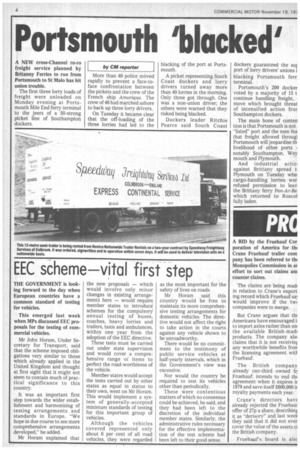EEC scheme vital first step
Page 6

If you've noticed an error in this article please click here to report it so we can fix it.
THE GOVERNMENT is looking forward to the day when European countries have a common standard of testing for vehicles.
This emerged last week when MPs discussed EEC proposals for the testing of commercial vehicles.
Mr John Horam, Under Secretary for Transport, said that the scheme imposed obligations very similar to those which already applied in the United Kingdom and thought at first sight that it might not seem to contain much of practical significance to this country.
It was an important first step towards the wider establishment and harmonising of testing arrangements and standards in Europe. "We hope in due course to see more comprehensive arrangements developed," he added.
Mr Horam explained that the new proposals — which would involve only minor changes in existing arrangements here — would require' member states to introduce, schemes for the compulsory annual testing of buses, coaches, heavy lorries and trailers, taxis and ambulances, within one year from the adoption of the EEC directive.
These tests must be carried out under state supervision and would cover a comprehensive range of items to perfect the road-worthiness of the vehicle.
Member states would accept the tests carried out by other states as equal in status to their own, went on Mr Horam. This would implement a system of generally-accepted minimum standards of testing for this important group of vehicles.
Although the vehicles covered represented only about 6 per cent of all road vehicles, they were regarded as the most important for the safety of lives on roads.
Mr Horam said this country would be free to maintain its more comprehensive testing arrangements for domestic vehicles. The directive would not affect the right to take action in the courts against any vehicle shown to be unroadworthy.
There would be no commitment to the testimony of public service vehicles at half-yearly intervals, which in the Government's view was excessive.
Nor would the country be required to test its vehicles other than periodically.
These were contentious matters of which no consensus could be achieved, he said, and they had been left to the discretion of the individual member states. Similarly, the administrative rules necessary for the effective implementation of the test scheme had been left to their good sense.




































































































